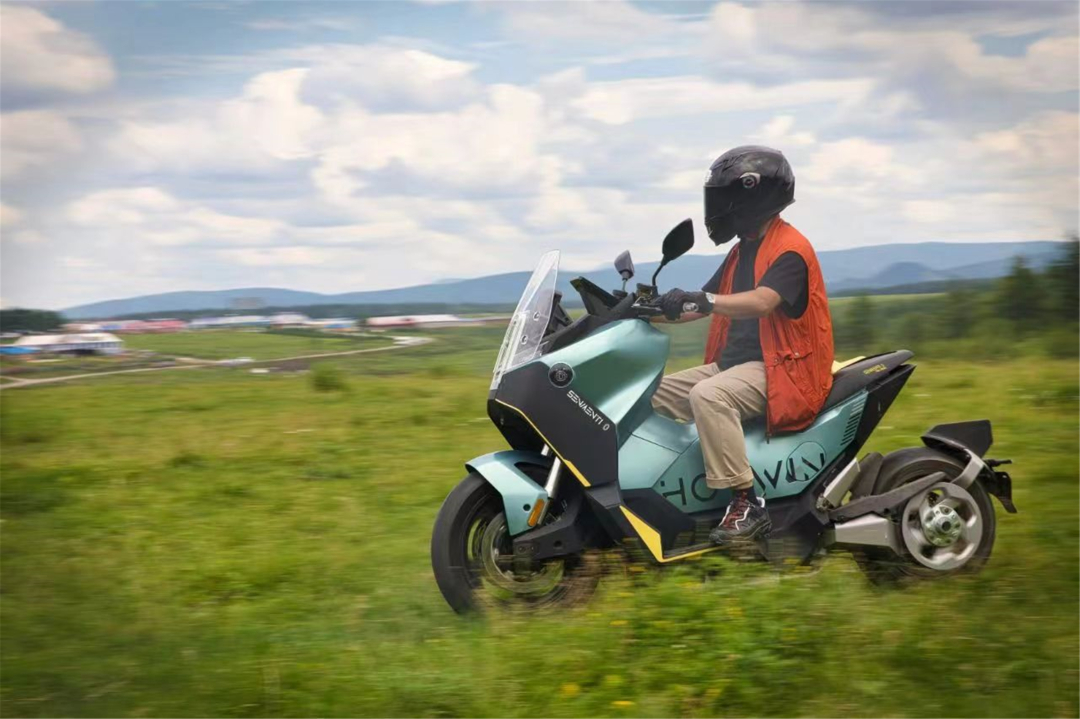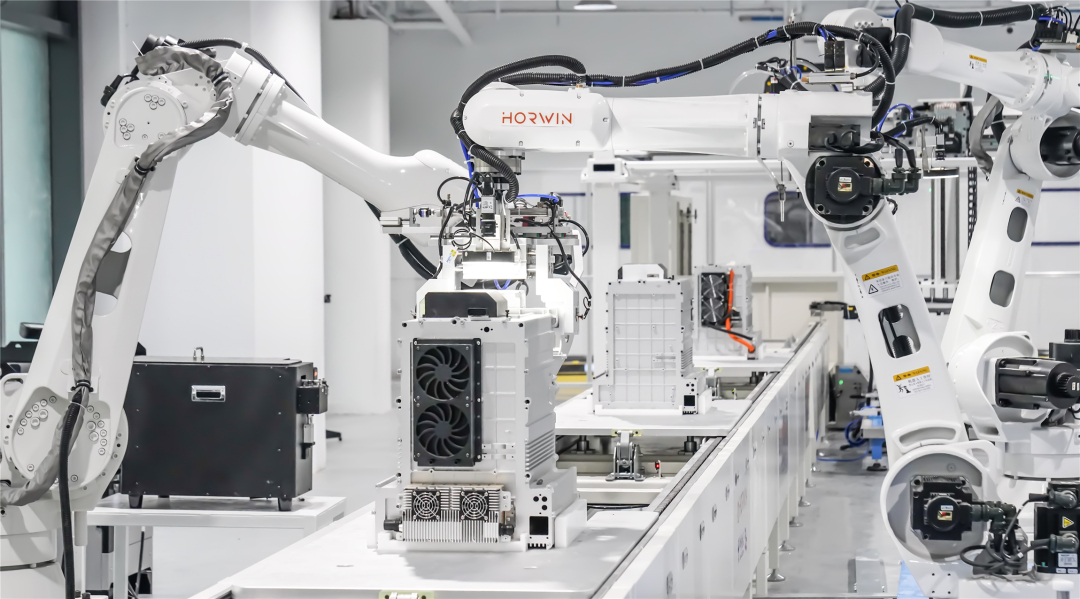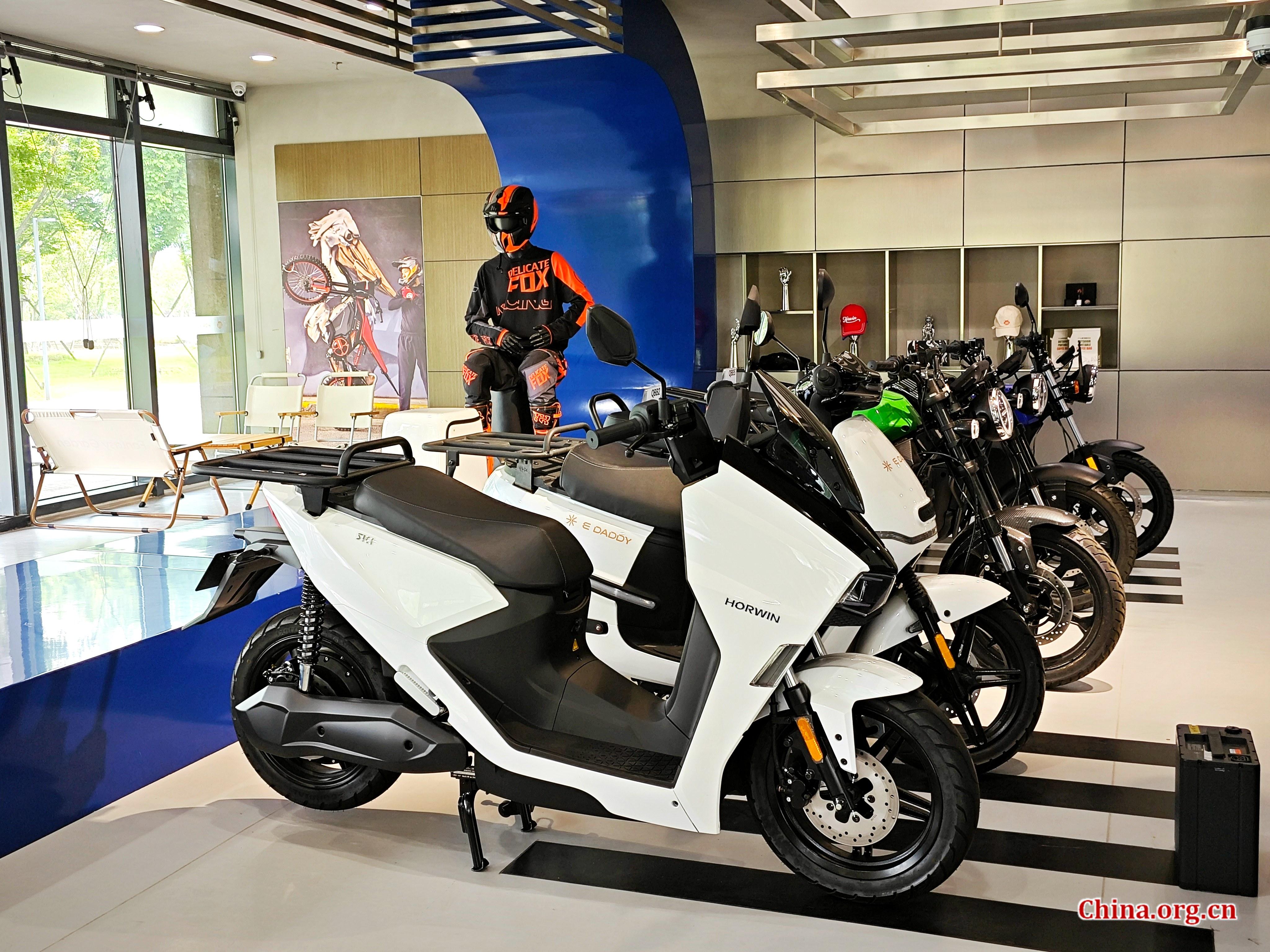
 0 Comment(s)
0 Comment(s) Print
Print E-mail China.org.cn, June 3, 2024
E-mail China.org.cn, June 3, 2024
Amidst the rhythmic movements of automated guided vehicles (AGVs) and robotic arms, the smart factory of Horwin Inc. hums with efficiency. Located in Changzhou city, east China's Jiangsu province, the company's founder Zhou Wei stands proudly in his factory, passionately introducing the award-winning electric motorcycle, the Senmenti 0.
On April 3, this electric motorcycle won the prestigious Red Dot Design Award, often referred to as the "Oscars of industrial design." This model boasts a 74kW maximum power, a 400V high-voltage platform and a 16.9kWh battery. It can achieve 0-100km/h in 2.8 seconds, a top speed of 200km/h, and a range of over 300km. In addition, the Senmenti 0 can be charged to 80% within 30 minutes.

Horwin Inc's Senmenti 0 electric motorcycle. [Photo provided to China.org.cn]
"For years, I've dreamed of creating a globally recognized brand in the two-wheeled electric motorcycle industry," Zhou says with enthusiasm. His company Horwin is now realizing that vision.
Born in 1985, Zhou Wei witnessed China's rise as a manufacturing powerhouse. He spent over a decade in the foreign trade industry before discovering a significant market opportunity for two-wheeled electric vehicles during a visit with European clients.
"During those years, I found most of the business that Chinese do overseas was OEM. Some clients were willing to pay 40% more for German-branded products, which were actually crafted by Chinese hands. This made me determined to create a Chinese brand for the world," Zhou recalled.
As a motorcycle enthusiast, Zhou noticed the growing market for electric motorcycles abroad. "In China, electric motorcycles are more like entertainment tools, while in Europe, two-wheelers are convenient for commuting in city centers. In African countries, they are essential for livelihoods," he noted. Zhou also observed the world's pivot to more sustainable practices with the increase in global efforts to reduce carbon emissions and embrace renewable energy sources, further fueling his ambition to enter the electric vehicle market.
After extensive research, Zhou launched his entrepreneurial journey in 2016. At that time, there was no prominent electric motorcycle brand globally.
He strategically established his company in Changzhou city, Jiangsu province, renowned for its cluster of new energy industries. "Motors, batteries and electronic controls are the three core components of new energy vehicles, and almost all parts needed for a vehicle can be sourced within Changzhou," Zhou explained.
He believed that Changzhou's robust new energy industry supply chain could underpin the company's growth and that Horwin could leverage the spillover benefits from the four-wheeled new energy vehicle sector.
The company developed L3-class electric motorcycles, which have an engine displacement similar to 125cc or a top speed over 90km/h, tailored to European standards. By adopting a direct-to-consumer and wholesale model, Horwin quickly penetrated the European market. "Now, 60% of our sales are in the European market, with our European headquarters in the Netherlands," Zhou said.
Horwin's swift expansion is propelled by its significant R&D investment, representing 10% of its revenue. This strategic focus has enabled the company to overcome technical challenges and secure a robust patent portfolio exceeding 200, including innovations such as an integrated smart chassis and an intelligent cockpit.

Horwin Inc.'s smart factory in Changzhou, Jiangsu province. [Photo provided to China.org.cn]
According to Zhou, their electric motorcycles are now sold in over 100 countries, ranking among the top three in the European market. In 2023, Horwin's overseas revenue approached 1 billion yuan.

Zhou Wei, founder of Horwin Inc., introduces how he expanded the company in Changzhou, Jiangsu province, on June 1. [Photo by Wang Yiming/China.org.cn]
The company quickly adapted to different market needs, particularly in Africa, where they signed a $1 billion agreement with Benin's SPIRO company last year and secured exclusive deals in several African countries.

The Horwin SK electric motorcycle in the showroom of Horwin Inc., in Changzhou, Jiangsu province, on June 1. [Photo by Wang Yiming/China.org.cn]
"Responding to the Belt and Road Initiative, we also helped African countries build charging facilities and battery swap stations, aiming to enhance their green energy infrastructure and reduce reliance on fossil fuels," Zhou said. The company has already exported nearly 30,000 electric motorcycles to Africa.
"Innovation is not always about emerging fields. China advocates inclusive innovation, which brings the benefits of technological advancements to ordinary people worldwide, including the underdeveloped regions," said Zhang Hua, deputy head of the Jiangsu Institute of Science and Technology Development Strategy.
Zhang analyzed the company's success: "As a Chinese company going global, Horwin leverages China's robust manufacturing base and supply chain to capture the high-value ends of the smile curve, focusing on R&D, design and brand marketing."
Horwin's story is a microcosm of China's larger narrative, a tale of a nation's shifting from being the world's factory to its innovation powerhouse, Zhang added.
Back at the factory, Zhou Wei unveiled Horwin's latest concept vehicle under development. The sleek design and innovative features hint at the future of electric mobility. "While four wheels carry the body, two wheels carry the soul," he says with a smile, grounded yet aspirational.

A concept vehicle in the showroom of Horwin Inc., in Changzhou, Jiangsu province, on June 1. [Photo by Wang Yiming/China.org.cn]